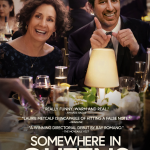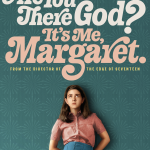Following the sudden death of his mother, a mild-mannered but anxiety-ridden man confronts his darkest fears as he embarks on an epic, Kafkaesque odyssey back home.
Chuck says:
Maddening from beginning to end, containing stretches of stultifying tedium and sequences of artistic brilliance, Ari Aster’s “Beau is Afraid” is, if nothing else, one of the most unique cinematic experiences you’re likely to have this or any year. A departure from the director’s two previous films, “Hereditary” and “Midsommar,” this is a darkly comic horror tale of the mind. We share in the protagonist’s psychosis, as we see the world through his perspective, one that’s filled with daily violence, disappointment, and doubt. However, as the title indicates, the prevailing emotion that hobbles Beau throughout is fear as he suffers from a debilitating sense of dread, a condition that dictates everything he does, and more importantly, doesn’t do.
Like Dicken’s “David Copperfield,” Beau’s story begins with his birth, an event that sets a pattern that will dog him his entire life. His mother in hysterics, her child needing to be resuscitated, it is a moment of tension and angst that will be repeated again and again between mother and son. The first of many fade outs occur and we then see Beau (Joaquin Phoenix), an obviously depressed middle-aged man, going into what is surely the latest of hundreds of therapy sessions. He’s set to visit his manipulative mother, a foreboding proposition fraught with potential triggers. Beau manages to psyche himself up to undertake this trial when he’s thrown a curve. His mother, Mona Wasserman (Patti LuPone), has been found dead, her head obliterated by a chandelier.
On paper, this obviously isn’t funny but in Aster and Phoenix’s hands this revelation becomes a darkly comic moment that sets the tone for the rest of the film. What ensues is a nightmare odyssey as Beau sets out for his mother’s funeral, meeting one ridiculous obstacle after another, none of which can be overcome without courage and fortitude, both of which are in short supply where our hero is concerned. A well-meaning, grieving middle-aged couple (Nathan Lane and Amy Ryan), their unstable daughter (Kylie Rogers) and a maniacal war vet (Denis Menochet) all hinder his progress, while a traveling theater troupe provide him with direction in the most unexpected way.
Flashbacks are employed throughout as we become privy to how the disfunction between mother and son grew and blossomed, while a key moment from Beau’s adolescence is shown, the ramifications of which become apparent during the third act. The sense of absurdism that prevails throughout takes some adjusting to and if certain viewers resist it throughout, that is understandable. The world Beau lives in is more akin to the universe Wyle E. Coyote occupies, illogical disasters lurking around every corner, logic just so much collateral damage in Beau’s fractured mind. Fear is the thing that haunts his every waking moment, and his world is one in which everything he is afraid of is manifested in some way. It’s a nightmare vision but one so ridiculous, you can’t help but laugh.
It goes without saying that Phoenix gives a great performance; there are few actors as committed as he is and there’s no question the film wouldn’t work without the dedication he displays. If ever the phrase “your mileage will vary” applies to a movie, it’s this one. Some will be entranced, others repelled. As for those grappling with issues of parental abandonment or emotional abuse, this may prove cathartic or traumatic. Daring and polemic, “Beau” is, if nothing else, a distinctive statement from a director who has no fear where it comes to plumbing the most disturbing human behavior and exposing it for the world to see.
3 Stars




